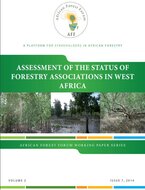Professional associations are needful for effective coordination of professional activities to enable them achieve the aims and objectives of setting the up. Such associations abound for most professions in Europe, America and Asia. They are gradually finding relevance in Africa. The prevalence of professional forestry associations in West Africa was investigated.
The study covered Benin, Cameroon, the Gambia, Ghana, Liberia, Nigeria, Senegal and Sierra Leone. Indices examined include mission, governance, effectiveness, efficiency relevance, financial viability, leadership, strategic and programme planning, programme implementation, monitoring and evaluation as well as networking/partnership/linkages. Of the eight countries studied, Benin and the Gambia did not have professional forestry associations.
By far, the most established and active of the six associations examined in the sub-region is the Forestry Association of Nigeria (FAN) founded in October, 1970, followed by Forestry Association of Ghana (FAG) and The National Forestry and Wildlife Association (NFWA) of Sierra Leone. Though all the associations have governance structures, the relative strength of each of them determines their effectiveness, efficiency and financial viability. All the associations are resource-poor and need to be strengthened in terms of administration and funding to enable them accomplish their missions better. An umbrella forestry association is recommended for Africa, with nodes in sub-regions. The African Forest Forum is most suited to facilitate this.

